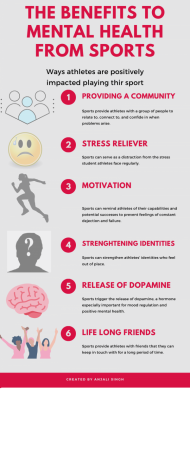The Power of Sports
How different athletes benefit mentally when playing a sport
Wei (top right) poses with his club team holding a “get well soon” poster after one of his teammates broke his wrist during a game.// Used with permission from Rick Wei.
December 3, 2019
As he trudged off the soccer field after a long club season game, all junior Rick Wei could think about was relaxing, hanging out with his teammates and heading back home. However, as he was packing up, Wei received a notice that his mom was in the hospital — she had passed out at the gym.
“[After receiving the news,] I told [my teammates] and everyone was instantly receptive — they were all [asking if I needed] help or a ride home,” Wei said. “That environment where we’re basically family and we want to help each other is super beneficial [in these situations].”
Wei believes that his eight years of playing soccer have provided him with an outlet to relieve stress and a community to rely on. Even though Wei acknowledges the positive impact of soccer on his endurance and overall health, he explains that the physical benefits aren’t the real reason he benefits from soccer. For Wei, working out at the gym — while it may provide similar health benefits — has a negligible impact on mental health compared to playing soccer with a team he can confide in and hear their opinions on his problems.
“I like being with other people because it allows me to see [my issues] from other perspectives and see how other people think,” Wei said. “[One time] I had a really rough week and it [was] so hard to focus on things, but then when I went to soccer practice, all my teammates were there to help me get through it and we pushed through as a unit.”
Despite not playing for MVHS varsity boys soccer in the past, Wei made the team this year and he hopes to not only experience wins with classmates but also bond with a group he can relate to.
“My team in club, we’re all from different schools. Sometimes we can’t [always] connect together in terms of only stress or homework,” Wei said. “[For MVHS soccer], since we’re all from the same school and some of us are in the same classes, we know how to deal with problems together.”
Similar to Wei, senior and Raas dancer Shreya Ganapathy has used dancing as a way to improve times when she is stressed. While Wei believes that the bonds he is able to build with his teammates distract him from stress, Ganapathy explains that dancing removes her stress because it pushes her capabilities, especially when she feels burnt out.

“I was really stressed in sophomore and junior year, [but] I would realize that when I would go to [dance] practices, I would feel really good about myself,” Ganapathy said. “[I would] feel confident about myself because I was able to get the specific steps faster than other girls on the team so that just made me feel really good. For me, I feel like [dance] is my way of feeling capable. It makes me feel hopeful and more determined.”
Ganapathy sees dance as a way to remind herself of her successes, which she often overlooks. After receiving a bad test score one day, Ganapathy recalls being upset about it the whole day before practice, but within a few minutes, she was able to forget about the grade and was more prideful of her resilience and focus throughout the practice.
“[Dance] was a stress reliever and it was a distraction from all the work I had to do,” Ganapthy said. “[It provided me] an environment where I didn’t feel like I was failing, or I was going to fail. I always [feel] that when [I am] in school, so it’s a break from it. I want to be able to not worry about little things [like tests].”
De Anza College athletic trainer Christiana Kaleialii recalls her own experiences with a community playing rugby for her college, Fresno State. Kaleialii explains that while she does sometimes face mental drawbacks like the fear of failure when playing her sport, there are still many benefits to playing sports.
One of these is the release of dopamine due to physical activity, which according to Healthline, plays a large role in mood regulation and overall positive mindsets.  Another benefit of playing sports that she emphasizes is that it can strengthen distressed athletes’ identities. While Kaleialli believes in the power of sports, she stresses that it’s more important for people to participate in any type of activity that can alleviate their stress instead of worsening it. For Kaleialli, some of her best friends are the people she met in rugby who she still keeps in touch with and confides in when she is stressed.
Another benefit of playing sports that she emphasizes is that it can strengthen distressed athletes’ identities. While Kaleialli believes in the power of sports, she stresses that it’s more important for people to participate in any type of activity that can alleviate their stress instead of worsening it. For Kaleialli, some of her best friends are the people she met in rugby who she still keeps in touch with and confides in when she is stressed.
“The positives of being in a sport is being in a community and feeling a part of something, and that’s one of the biggest contributors to positive mental health — it’s giving [athletes] a purpose,” Kaleialli said. “[Sports] give you a better network of people to talk to. Participating in a sport is going to be better for you in the long run. It gives you friends that you’ll have forever.”


















